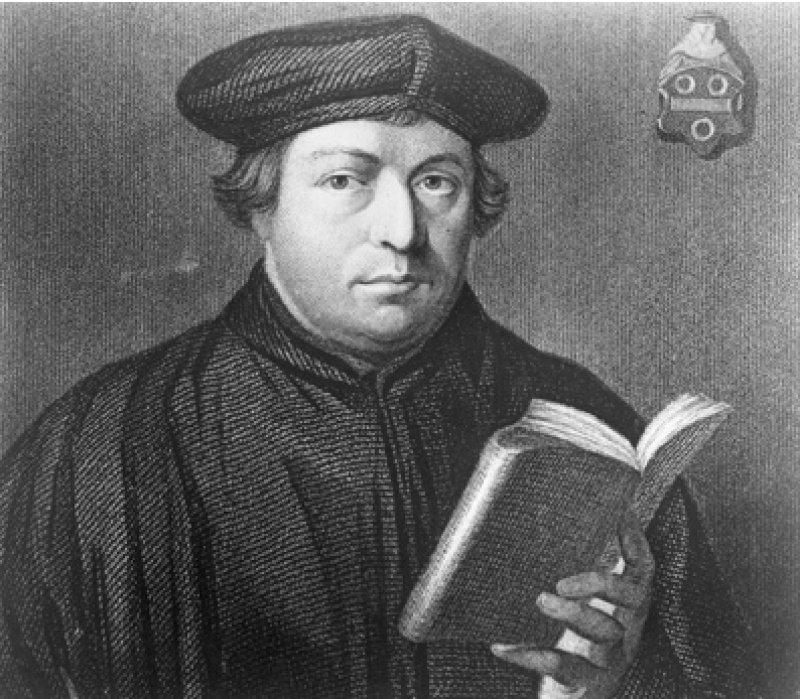

Thesis 2.
Much less can human works, which are done over and over again with the aid of natural precepts, so to speak, lead to that end.
"Since the law of God, which is holy and unstained, true, just, etc., has given man by God as an aid beyond his natural powers to enlighten him and move him to do good, and nevertheless the opposite takes place, namely, that he becomes more wicked, how can he, left to his own power and without such aid, be induced to do good? If a person does not do good with help from without, he will do even less by his own strength. Therefore the Apostle, in Rom. 3:10-12, calls all persons corrupt and impotent who neither understand nor seek God, for all, he says, have gone astray." (LW:31.42-43)
This thesis extends the focus of the first thesis. The first thesis deals with doing good works under Divine Law, while this thesis deals with human works according to the constant prompting of "natural powers" within us. The revealed law of God cannot advance fallen beings toward righteousness. Much less, how is "natural power" in us able to do so?
To understand this thesis, we need a better understanding of the scholastic theology in the late Middle Ages.
According to scholastic theologians in Middle Ages, including Thomas Aquinas, in spite of Adam's corruption, the innate understanding of good has its source in an uncorrupted state or condition of human nature. They called it "synteresis," which is the natural capacity or disposition (habitus) of the practical reason to apprehend intuitively the universal first principles of human action. The scholastic theologians closely identified the synteresis with ratio but voluntas, which enable us to do good, lies in the center of humanity after human's corruption.
On the basis of this, the scholastic theology dealt with "the righteousness of God'. The grace of God was not without cost, but was conferred by God as a reward for the acts humanity performed according to "synteresis', "the reason' or "will' to do good. The believer performs works for which more grace and merit are bestowed as deserving of a reward. For the medieval theologians, salvation was the combination of works by humanity and God.
But Luther rejected this understanding of "synteresis' by the scholastic theologians in the Middle Ages. In his Lectures on Romans, Luther states: "this concupiscence (original sin), is always in us, and therefore the love of God is never in us unless it is begun by grace."(LW 25, 262) Especially, on the exposition of the Romans 3: 10, he said: "We are not so totally inclined toward evil that there is not reminder of us which is affected toward the good, as is evident in the synteresis"(LW 25, 222). In this thesis and in the proofs of this thesis, Luther once again stresses this. Following St. Paul, Luther argued that there is nothing in us that causes us to do good works, because we were totally corrupted. For this reason, without help from outside, humans cannot advance righteousness.
Luther's opponents often made criticisms on his assertion by saying: "Luther's theology weakened human's responsibility and sanctification of the believer". However, what Luther is trying to say here is mightily offensive to the arrogant belief that humanity can advance God's righteousness by doing good works. In other words, only God's grace enable us to advance on his way to the righteousness. This is because there is no reminder within us to receive grace and the power of salvation.
These days, this understanding of the synteresis in the Middle Ages has evolved into new forms: "humanism', "rationality' and "scientism."
Recently, with a strong request by the AHA(American Humanist Association), the U.S. Air Force decided that soldiers have the option to omit "so help me God' from their enlistment oaths or oaths to take officer appointments. A well-established international Christian student group is being denied recognition at almost two dozen California college campuses because it requires leaders to adhere to Christian beliefs, effectively closing its leadership ranks to non-Christians and gays.
A couple of years ago, Richard Dawkins, in his book, The God Delusion, said: "A supernatural creator almost certainly does not exist and that belief in a personal god qualifies as a delusion" He also argued that the scientific theories are superior to a "God hypothesis""”the illusion of intelligent design"”in explaining the living world and the cosmos.
The renowned English physicist and cosmologist Stephen Hawking, in his book, The Grand Design, argued that Philosophy is Dead and God just wasn't necessary because the scientific theory can explain the existence of the universe.
The thesis 2 is not just a historical issue Luther raised against the Roman Catholic Church in the late Middle ages. The challenge of modern science and humanism to Christianity showed us that this thesis is still just as important today as is was in Luther's time.
Luther speaks again in the Thesis 2: "the power of reason and science can never advance us on the way of righteousness as well as give us the knowledge of God." The theology of the Cross begins from the powerful message: "the law and natural power of human can never save us."

Reverend and Doctor Jin O Jeong is an assistant pastor for the Korean congregation at Zion Lutheran Church, Belleville, IL. He graduated from Luther University and received a Ph.D from Yonsei University. He was also a Research Fellow at Hebrew University and Visiting Scholar at Yale Divinity School. Tel: 618-920-9311 Email : jjeong@zionbelleville.org



















